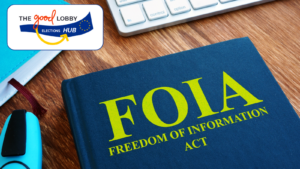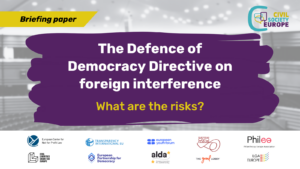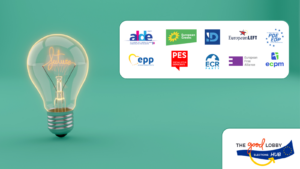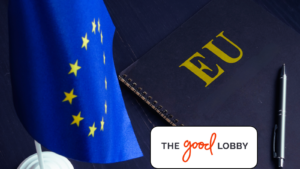By Alberto Alemanno and Michele Crepaz
What should lobbying be about and how to regulate it? The great virtue of thought experiments is they expand the realm of debate. For that reason, we recently challenged the participants of The Good Lobby Summer Academy to partake in a simulation game and prepare a global lobbying standard, capable of adapting to the evolving nature of global politics, and, at the same time, guaranteeing integrity, transparency and equal participation.
The plot
Drawing from the climate fiction literature, we imagined that – in a world just a few years from now – a new UN subsidiary body is established under the Paris Agreement. As the first global stocktaking didn’t go well – with global C02 emissions levels far higher than what the contracting parties had promised each other they would be –, it was decided that this new body – labelled the ‘Ministry of the Future’ – would have to advocate for the world’s future generations of citizens. Thus, for instance, the Ministry would be the authority competent to propose whether and how to deploy geo-engineering interventions, such as solar radiation modification, to counter a heat wave or to promote new policies preserving future generations’ interest – from mandating central banks to address the climate crisis (instead of pouring money into fossil fuels) to capping on personal CO2 emissions. However, being the constant target of a variety of stakeholders’ lobbying efforts and too often antagonized by the loud voices of some industries, the Ministry decides to embark on a new line of work. It plans to put a proposal to the UN Assembly to enact a Global Framework for the Regulation of Lobbying for the Future aimed at governing whether and how external stakeholders may engage with the UN, and beyond, to represent both present and future generations’ interests.
The format
To this purpose, the Ministry of the Future convened a major public consultation, in other words, the setting of our simulation game. The results of this consultation would lay down the rules for the interest representation by external stakeholders at COP, but would also commit UN members to introduce such frameworks nationally within the next five years.
This is how we set the stage at The Good Lobby Summer Academy. More than 50 participants joined the simulation game which played out over the course of three days. Participants were divided into pre-established groups representing different stakeholders in the consultation. Each group was formed by at least six delegates with different professional backgrounds. To maximise diversity, we asked corporate representatives to act on behalf of civil society organisations, and climate advocates to representing the industry, including the fossil fuel, while mixing up senior and junior positions within each group. In addition to the UN Ministry of the Future, which acted as convenor of the public consultation and set the rules and agenda, seven following stakeholders were invited to participate:
- the OECD delegation of the Directorate for Public Governance, with its expertise gained among the most developed countries and based on its pool of experts;
- The International Association of Oil and Gas Producers as the umbrella association representing major global actors in this sector;
- The International Chamber of Commerce as representative of business organisations globally irrespective of their economic sector;
- The Environmental Defense Fund as one of the largest environmental organisations globally;
- The International Public Relations Associations as one of the largest and most representative associations of public affairs professionals;
- Transparency International as the leading, globally active transparency watchdog on anticorruption including lobbying and other, subtler forms of political influence as well as
- The Network of Future Generations Institutions as an independent, non-formal network of institutions worldwide for the protection of the interests of future generations.
The process
Over the course of three days, these stakeholders – personified by the Academy’s participants – convened several times to draft their policy proposals for a Global Framework for the Regulation of Lobbying for the Future. Each group was tasked with identifying the objective(s) pursued by this framework and come up with policy options the Ministry should implement to achieve these objectives. In so doing, participants could draw from the many panels at the Academy discussing many of these cutting-edge topics transversally, from the contested nature of trade association and their opaque governance to the best lobbying practices de facto introduced by ESG data providers as gathered by The Good Lobby Tracker.
The policy ideas for lobbying reform
Here are the most relevant ideas that were discussed by stakeholder groups and those that, in the end, were retained by the Ministry of the Future in its final proposal.
First of all, while traditional objectives of transparency in lobbying were recognised as important, all stakeholders overwhelmingly saw accountability, responsiveness and participation as additional objectives of any new lobbying framework. As increasingly put forward by scholarly research and practice, transparency is only one of the key principles of ‘responsible lobbying’. As such, stakeholders asked for a framework requiring more responsibility from both policymakers in terms of institutional design and corporations in terms of self-restrain in the exercise of their political power. A more structured and formal approach to the involvement from external actors in policymaking appears urgently needed.
To achieve these ambitious aims (beyond transparency), stakeholders proposed (and the Ministry of the Future promptly endorsed) some of the ‘usual suspect’ policy instruments, among others lobbying registers – here to be implemented at a global level – enshrined in a global definition of what constitutes lobbying, and registers disclosing policymakers’ agendas and meetings. We also saw a mix of old and new lobbying rules, with for example, provisions being proposed to restrict the revolving doors between industry and politics through cooling of periods, with, however, the addition of extended cooling off periods for former ministers moving into a sector they previously regulated, and pending legal assessment, lifetime ban for certain sectors. There was also extensive debate about new and very innovative interventions. Thus, to address transparency, the Ministry accepted proposals from stakeholders that envisaged the creation of a lobbying footprint methodology. It was suggested that, going beyond standard registration of lobbyists, existing legislative footprint procedures would now include evidence of lobbying activity. This includes tracking and tracing of memos, policy position documents and communications between policymakers and external actors, as well as a report filed by lobbyists about the digital space they occupied on the given issue.
To improve accountability and link it to transparency, the Ministry accepted the proposal of embedding the principle of whistleblowing into lobbying and ethics in public office guidelines. Public registers, international organisations and government websites should, going forward, include reporting mechanisms embedded in whistleblowing legislation to safeguard reporting parties. This would require the UN and its members to agree upon a Global Framework on Whistleblower Protection for the Future parallel to that on lobbying regulation.
To further ensure accountability and responsiveness of decisionmakers, the Ministry accepted the proposal of creating public dashboards showing divergence between, for example, manifesto commitments and voting records. This principle is not new in national politics, as seen in the famous example of They Work For You. However, the Ministry felt that to address the needs of future generations, more needed to be done on the policymakers’ front, especially at global decision-making venues, such as COP, where ‘scapegoating’ is more likely to happen. Perhaps most innovatively, the Ministry accepted proposals to increase participation of external stakeholders in global decision-making, more specifically, to level the playing field for participation. In order to do so, the framework should adopt a stakeholder identification strategy to be implemented at the start of decision-making processes. Interestingly, the Ministry agreed with the idea to introduce participation quotas for what the stakeholder identification would label as ‘marginalised’ or ‘less represented’ groups. Moreover, quotas would ensure that no single group can dominate the conversation and would also incentivise coordination among actors within the same sector that would not make the quote. It follows that this could increase coalition work, and activate umbrella and representative groups.
Last but not least, the Ministry stressed an often-neglected aspect in transparency and integrity reform, namely implementation, enforcement and review. “The Ministry for the Future will be empowered to implement this Framework and hold the subject stakeholders accountable. This includes adequate staff to fulfil these missions, funded by each member state of the UN” and to hold its work accountable and ensure regular review of the progress, it will create “a multistakeholder Oversight Board, to ensure good functioning and to uphold the overall principles of the Framework.”
As designers, convenors and moderators of the simulation game/consultation, we were positively surprised by the quality of the ideas put forward by the Ministry and the participating stakeholders’ deliberative skills. As scholars of politics and law, who have specialised on this topic over the last decade, we are still processing this learning experience.
Take-aways
Here what we think are the main take-aways from the exercise for anyone interested in equalizing access to power through lobbying reforms and other forms of democratic innovation.
- Look into the future to generate new ideas. There is a huge space for innovation, especially when one moves beyond transparency to include other policy objectives, such as participation, for lobbying regulation. We know that vision (transparency) and voice (participation) go well together, but we need to find ways of formalising structures that allow us to foster debate, equality and attention to marginalised (or absent) groups. Clearly, thinking about reform with future generations in mind is a good exercise for this, as it forced us to come up with innovative solutions, since traditional instruments are ill-suited for this goal. This perspective applies well beyond lobbying reform and applies to virtually any other policy area.
- Potential solutions may already exist. Things like quotas and reporting mechanisms have been successfully applied in other policy areas. Bringing different and diverse experiences together can help imagining these interventions outside of their traditional application and transposed into the issue at hand.
- Don’t dismiss old ideas. Existing lobbying regulations pursuing the aims of integrity and transparency have not become useless. As research suggests, what makes them ineffective lies in poor implementation and lack of enforcement. Before replacing old with new ideas, we should do what we have done so far well. Adequate resources, regular review, use of technology are only few of the suggested ways discussed at the The Good Lobby Academy for making that happen.
- Be humble. More than anything else, the simulation game reminded us, as scholars, how little we know about the effects of lobbying interventions and reforms. For example, we see cooling off periods as a solution to revolving door issues, yet we fail to fully understand and quantify their effects on conflict of interest prevention. This is an open invitation for political scientists, scholars in public policy, public administration, sociology, law and other fields to consider focusing on studies of policy evaluation in this area and start to fill the knowledge gap that lies ahead of us.
- Leave the office and get your hands dirty. We wish to invite the scientific community to engage more often with policymakers and representative groups – and vice versa – to discuss what is known in more detail. While the Summer Academy has historically been showing that great engagement between these two communities is possible, it also highlights how limited that engagement would otherwise be. This is not acceptable if meaningful debate around reform has both these communities sitting at the same table.
You can read the full case study here and offer your comments and reactions to its authors, Professors Alberto Alemanno ([email protected]) and Michele Crepaz ([email protected]). The authors wish to thank Dr Bert Fraussen of Leiden University who has contributed to both the contents and design of the simulation game. A final special thank goes to all participants in The Good Lobby Summer Academy whose attention and intention to learn, share and inspire have made all the difference.
See you on July 22-25, 2024 in Bilbao for another edition of The Good Lobby Summer Academy!
Image credits to Gerd Altman – Pixabay







